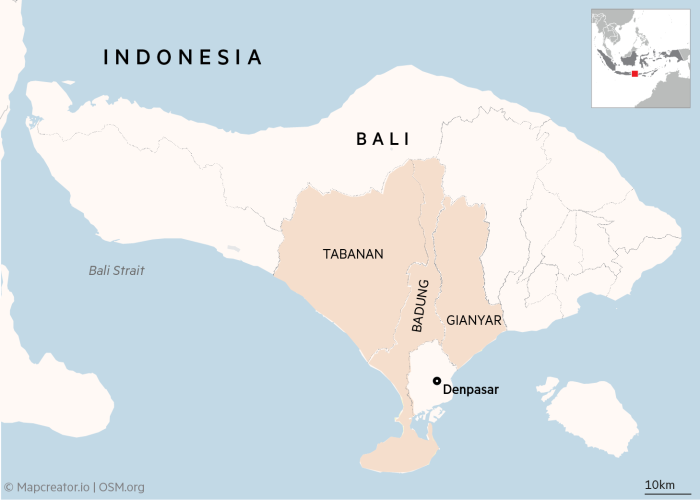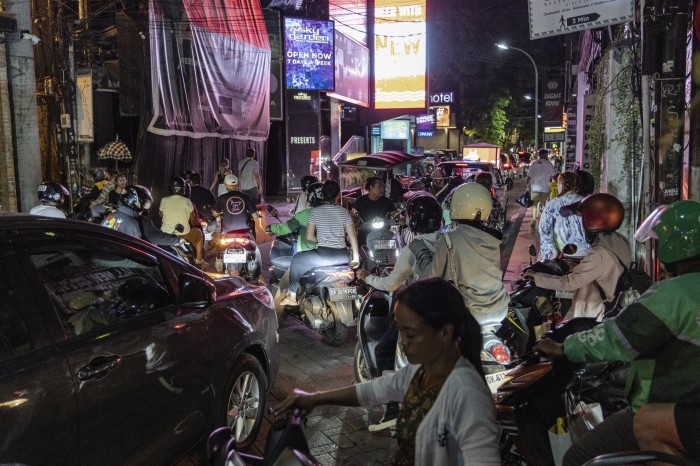
Unlock the Editor’s Digest for free
Roula Khalaf, Editor of the FT, selects her favourite stories in this weekly newsletter.
Indonesia is considering a moratorium on building more hotels and nightclubs in the tropical holiday destination of Bali, as congestion, rowdy tourists and the conversion of paddy fields to luxury villas anger residents in the “island of gods”.
The provincial government in Bali, famed for its endless beaches, vibrant culture, rich marine biodiversity and surfing spots, has asked the central government to suspend new commercial construction in four tourist hotspots. The timing and length of a ban are yet to be finalised.
“Bali’s provincial government has proposed a moratorium on the development of hotels, villas, nightclubs and beach clubs in four busy areas,” Ida Ayu Indah Yustikarini, the head of the Bali tourism office’s marketing division, said at a press conference this week. “The objective is to encourage a quality tourism industry.”
President Joko Widodo’s administration, which will make the final decision on any moratorium, has said it is agreeable to such a move. “No more villas in rice fields . . . I want Bali to be a clean destination, with a good environment, to become a quality destination,” said Luhut Binsar Pandjaitan, Indonesia’s co-ordinating minister for maritime and investment affairs, according to local news website Detik. The moratorium “could be five years, it could be 10 years . . . [we] will evaluate”.
Bali joins a string of other tourist destinations looking to blunt the impact of overtourism. Greece said this month it would crack down on short-term holiday rentals and cruise ship traffic, while Italy is mulling a sharp rise in tourist tax.

One of Indonesia’s 17,000 islands, Bali has become the country’s top tourist draw. The success of the 2006 book Eat Pray Love and a movie adaptation starring Julia Roberts has also helped fuel a tourism boom.
The island attracted 3.5mn foreign visitors between January and July this year, up 22 per cent from the same period last year, according to official data.
Its growing popularity has triggered a backlash. Bali residents often complain of traffic jams, crime, overdevelopment and disrespect for Indonesian culture. Indonesian officials also say many visitors overstay their visas and conduct business on tourist visas.
Hundreds of foreigners are deported every year from Bali for overstaying their visas and other illegal activities. A Russian man was deported last year for posing naked on Mount Agung, one of Bali’s more sacred spots. This year, a British man was arrested for stealing a truck and crashing it at the airport.
“Many locals feel that Bali’s unique culture and traditions are being commercialised or diluted to cater to mass tourism,” said Kadek Adnyana, founder of the Bali Villa Rental and Management Association. The rapid construction of hotels, resorts and villas have put a strain on local infrastructure, he said. “This unchecked development is often viewed as damaging Bali’s natural beauty and causing unsustainable growth.”

Commercial developments catering to tourists have sprung up all over Bali. The number of star-rated hotels hit 541 last year, up from 113 in 2000. Lush paddy fields have been destroyed to make way for luxurious accommodations as villa rentals in particular become more popular.
“The moratorium should have been implemented a long time ago,” said Made Krisna Dinata, an executive director at environmental group Walhi. “Bali has been overbuilt and should be firm in stopping infrastructure development plans.”
Bali is on the verge of an ecological crisis due to the impact of commercial and infrastructure developments, he said. The “decrease in rice fields and mangrove areas as well as coastal degradation will certainly make Bali more prone to disasters”.
Despite the growing ire of residents, the Indonesian government has sought to capitalise on Bali’s popularity. Indonesia has offered more flexible visas to attract digital nomads. Authorities are also mulling a plan to make Bali a hub for family offices as an alternative to Singapore and Hong Kong.
But residents in Bali — which is the only Hindu-majority province in the predominantly Muslim country — say they would rather the government did more to enforce regulations to prevent illegal activities by tourists, increase their cultural awareness and protect the local communities.
“While tourism generates significant revenue for Bali, many locals feel that the profits largely benefit foreign investors and larger corporations, rather than local businesses and communities,” said Kadek.